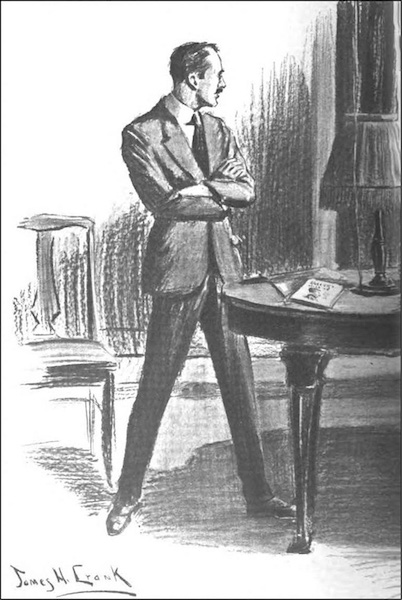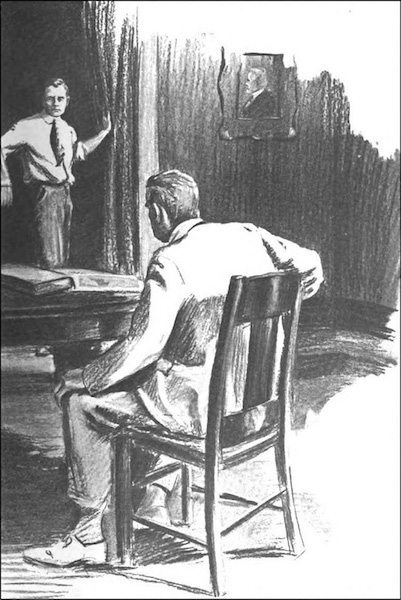The Last Drive (4 page)
Authors: Rex Stout

“Carson Phillips did not kill himself,” declared the doctor with conviction. “There was absolutely no reasonâI knew every detail of his lifeâand besides, he wasn't the man to sneak out of a thing. No.”
“Then the other three are left. The thought is repugnant to us. Admitted. Also, the hypothesis is difficult. It seems impossible that the thing could have been done without attracting notice. They all swear nothing unusual occurred. Can they be in league? I dismiss that as incredible. Then it was done, somehow, without attracting notice. How? And by whom? There motive enters. But the point is, how? If only I had been in that foursome! The blowpipe is out of the question as requiring extraordinary skill. There was some devilish trick somewhere.
“You know,” said the doctor slowly, “it's my opinion you're on the wrong track, Rankin. I can't believeâ”
“It's the only open track,” the detective retorted. “No other way to turn. Disagreeable as it is, we must follow it. There's one other thing I haven't spoken of.âHello! What's up?”
As he spoke the whirring of an engine had made itself heard, and now, through the window, an automobile, the one that had brought them to Greenlawn, was seen to turn about on the drive outside and head for the outer gate with a sudden leap forward. Fred Adams was at the wheel. An instant later Harry appeared on one of the gravel paths at the edge of the garden.
Doctor Wortley, who had joined Rankin near the window, threw it open to call to the young man:
“What's up, Harry? Where's Fred going?”
“Down to Morton's,” came the reply. There was a touch of disapproval in the tone. “Said he'd be right back in case you asked for him.”
The doctor had closed the window again before Rankin's query came:
“Morton's? Where's that?”
“Over west a few miles,” replied the doctor. “There's a girl. Dora Morton. Rather odd he should run off there just now.”

“I know you have charge of this thing, Mr. Rankin, but I must say that I don't see why you run away from it.”

Something in the tone caused the other to pursue the inquiry.
“Why?”
“WhyâCarson didn't approve of her. There's been a quiet sort of row on about it for some time. She's a daughter of Morton the cheese man, and wellâCarson's ideas were somewhat aristocratic, you know. I believe he even threatened to disinherit Fred if he didn't give her up.”
“Ah, I see,” said the detective softly.
CHAPTER III

B
ut Doctor Wortley did not permit the insinuation in the detective's tone to go unchallenged.
“Good heavens, Rankin,” he exclaimed, “you can't believe that Fred Adams would take his uncle's life for such a reason as that!”
“I don't believe anything,” the other returned impatiently. “Right now it isn't a question of who did it or why, but how it was done. We don't even know that. But to put it in plain words, I am convinced that one of the four members of that foursome is responsible for the Colonel's death. It's the only possible solution.”
As he spoke the sound of wheels was heard on the driveway outside. It was the conveyance that had been sent for to Brockton to carry the body of the Colonel to Greenlawn. Doctor Wortley went out to superintend the removal to the room that had been prepared upstairs, while Rankin went in search of Fraser Mawson.
He found the lawyer in a small room at the further end of the lower hall. This room was the place that Colonel Phillips had set aside for the transaction of business; it contained a desk and a safe and files filled with letters and documents of various kinds, all kept neatly and methodically after the Colonel's custom. As Rankin entered Mawson was in the act of taking a large book from a shelf in the safe, the door of which stood open.
“You seem to be acting on a thought that has occurred to me also,” observed the detective, stopping beside the desk.
The lawyer looked up at him inquiringly.
“I was just looking to see if there is anything out of the way,” he explained. “You know, I came down here from the city once a week to confer with Carson on his affairs. We were to have attended to it tonight; that was our custom.”
Rankin, nodding, found a chair, while the lawyer placed the book on the desk beside another that was lying there open. The fact of his having been entrusted with the combination of the safe, containing private documents of every description, was evidence of the complete confidence in which the dead man had held his attorney and lifelong friend.
“He kept everything here, I suppose,” observed Rankin presently.
The other nodded. “Everything. Except, of course, what was needed for any specific purpose, temporarily, in New York. Such were kept in my office.”
Silence, while the lawyer compared entries in one of the open books before him with those in the other, occasionally writing something in the latter. From the other end of the hall, through the open door, came the sound of many slow and heavy footsteps, those of the men who were carrying into Greenlawn the body of its dead master. Rankin, craning his neck a little, could see their straining forms framed in the outer doorway, with Doctor Wortley in front directing them.
“One thing I'd like to ask, Mawson,” resumed the detective after a moment. “Had the Colonel indicated an intention lately of making any change in his will?”
The question appeared to surprise the lawyer a little.
“None whatever,” was the reply. “Why, do you know of any reason?”
“Nothing in particular,” Rankin returned, “except that Doctor Wortley tells me that he had been having a difference of opinion with Fred concerning a certain young lady named Morton, I believe.”
“Oh.” The lawyer looked up from his writing. “Yes, there has been something said about it. Carson was much put out, and Fred wasâwellâobstinate. There were some pretty warm words, I believeâyou know, Carson had a temperâbut I don't think he ever seriously contemplated changing his will.”
“But Fred might have thought so.”
The lawyer frowned. “Of course. He might think anything. But it seems to me a pretty weak thread to hold a suspicion like that against a boy like Fred.” A moment's pause, then he added, “If you want my opinion, Mr. Rankin, it appears to me you're pursuing a delusion. If I am a little diffident about speaking it is only because I see that I am included in your thoughts as well as the two boys. Of course, you may have reasons that I know nothing ofâ”
“I haven't,” the other interrupted. “All that I know, you know.”
“Then I don't see what you expect to find at Greenlawn, unless you look for something among Carson's private papers. They are all in this room, and I am willing to stretch a point and submit them to your inspection, but I can tell you beforehand that your search will be in vain. As for Harry and Fred, it seems to me absurd even to entertain the possibility of their guilt of so black a crime.”
“Then just what is your opinion, Mr. Mawson?”
“One that I dislike to utter,” returned the lawyer with some hesitation. “At least, part of it, and that the most likely. It is forced on me by circumstances. It seems to me that there are just two possibilities. In the first place, I reflect that Colonel Phillips spent several years of his life in the Philippines and other parts of the Far East, and it isn't only in novels that the Orient is filled with strange enmities and mysterious crimes. Some act of Carson's, official or personal, some wrong, fancied or real, of many years ago, may have found its tragic sequel here on the Jersey golf links. Secondly, my long legal experience has taught me that any man's life is apt to contain a secret, a dark and shameful secret sometimes, that remains unsuspected even by his oldest and dearest friends, and that may drive him to any desperate deed, even the most desperate of all, to bury it.”
“Then you admit the theory of suicide?”
“Merely because as a possibility it cannot rightfully be excluded. Before Fred and Harry I rejected it, not to wound their sensibilities; and to me also the thought of self-destruction in connection with Carson Phillips isâwellâdistasteful. But reason requires me to admit it. The point is, the motive.”
“There is nothing here?” Rankin waved his hand about the room.
“Nothing. Everything is in the best possible condition, with the exception of one unfortunate financial deal, and that was hardly a serious inconvenience; it certainly was not vital enough to serve as the cause of tragedy. There is a lawsuit on with an estate in Connecticut; nothing serious.”
“What was the financial deal? A speculation?”
“Yes. Against my advice. United Traffic. Of course, you know the circumstances; the bottom fell out of it two weeks ago. I just got rid of the last of it yesterday; you see what it amounted to.”
The lawyer pointed to an entry in one of the books before him, on which the ink was scarcely dry:
2000 United Traffic 57 $114,000.00
1000 United Traffic 56 56,000.00
2000 United Traffic 52 104,000.00
“He bought around a hundred and twenty, so the loss amounted to something over three hundred thousand,” Mawson explained. “But, of course, it was only a temporary inconvenience.”
“Of course.” Rankin agreed. “Mighty imprudent, though, for Carson Phillipsâbut financial difficulties are beside the question. There is nothing else?”
“No. The best way, perhaps, would be to look yourself, but I know every paper in the room, and there is nothing. That isn't to be wondered at. If there were anything in Carson's life that might have ledâas it did leadâto this, he wouldn't have left evidence of it lying around where even I could see it. No, if my theory is correct, Mr. Rankin, the mystery of our friend's death isn't going to be easy to solve. For my part, I am not even convinced that it came from that little green spot that Wortley showed us. I'll have to have better proof than that little spot on his skin.”
“The symptoms were conclusive.”
“In a way. Second-hand. Wortley didn't get there till it was over.”
“The examination of the organs will settle it.”
“By Wortley?”
“Yes. He's at it now.”
“Of course, that will settle it,” agreed the lawyer. “I don't dispute the probable correctness of his diagnosis, but I wait for proof. Anyway, you have my theory. You understand my position in the matter. As the representative of the Colonel's heirs, I feel it my duty to defend them against what seems to me unjust suspicion. I thought it best to be entirely frank with you . . .”
“Then you think I am merely wasting my time here at Greenlawn?”
“I do. Not that I regard the time as particularly valuable. I doubt if any direct evidence will be discoverable anywhere. It is my opinion that if the mystery is solved it will be only after a most minute and thorough examination of the Colonel's life. I feel that the roots of this tragedy are buried somewhere deep in the past.”
“I wouldn't be surprised if you're right, Mr. Mawson.” The detective got to his feet. “But as you say, in that case the present time is of no peculiar value, and I believe I'll use some of it snooping around here just to satisfy an idea I've got. You've no objection to my looking through the safe?”
